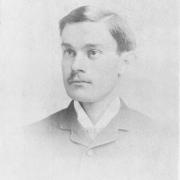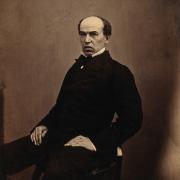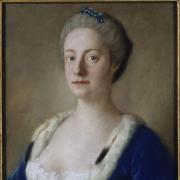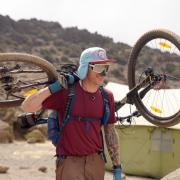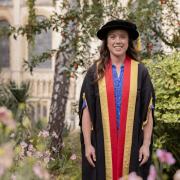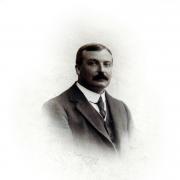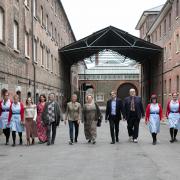Kent is blessed with enterprising businesswomen. Kent Life spoke to four about their motivation, ambition and achievements in a tough marketplace

Katie Ellis
Fashion expert Katie Ellis was inspired by her grandmother to create attractive clothing for disabled and older people.
When her fashion-conscious grandmother was diagnosed with Parkinson’s, Katie used her experience in the clothing industry to re-think conventional design.
For seven years, Katie, from Boughton Monchelsea, near Maidstone, was a successful fashion buyer for White Stuff, the women’s clothing retailer.
She assembled capsule collections, working with designers and merchandisers to create an attractive and balanced range.
Katie, now 29, could expect promotion. But the former Cornwallis School student decided to go from employee to entrepreneur to help her grandmother Sheila and others like her.
It was a bold move to leave White Stuff and start her own clothing business The Able Label
But seeing Sheila struggle with dressing convinced her that existing “adaptive” clothing needed a facelift.
They were both appalled by “awful” functional but unfashionable design. “She found dressing increasingly difficult,” says Katie “lacking strength in her fingers and hands so that fastenings were impossible. If you can’t get your clothes over your head or do fastenings, you can’t dress yourself.

“She loved her clothes, had always dressed well and taken pride in her appearance. To sacrifice style was very upsetting.”
Katie sought style with function, for example, by scrapping fiddly fastenings like buttons, keeping them as a decorative feature but replacing them with a premium type of Velcro that’s easy to open but doesn’t come undone when worn.
Bras were particularly challenging, requiring popper closures or swimwear-style fasteners at the front.
Katie worked with a former White Stuff designer and tested the products, mostly made in Portugal, on Sheila and people suffering from dementia, stroke or arthritis.
Katie works with charities and healthcare professionals to develop appealing designs.
Her creations are sold worldwide online, through retailers, mobility shops, charities and an Australian distributor. She would like to see more adaptive clothing stocked in mainstream stores.
Sally Bailey, former White Stuff chief executive and Topshop merchandising director, is Katie’s adviser. Vogue has featured her business and Joanna Lumley has added her celebrity endorsement.
Financial targets have been met and Katie aims for steady business growth “without being hard-nosed.” Being an entrepreneur suits Katie just fine. She talks to young people about the buzz of running a business and urges them to “go for it.” She’s on a Dragons’ Den-style panel at Canterbury Christ Church University.
“There’s more to life than working for someone else,” Katie believes. “I wanted to make a positive impact, to do something with my life.”

But entrepreneurship is not easy. “You have to be driven and passionate enough to get up every day and work hard.”
Her new status as fiancée may curtail those workaholic tendencies. Katie and Jason, who looks after the firm’s IT and website, were engaged on New Year’s Day and plan to marry in spring 2018.
Katie, who is now turning her attention to menswear, says she’s an entrepreneur for a purpose. “Our clothing has been creatively re-designed to be attractive and make dressing that bit easier.”
Sadly Sheila died last year. But her spirit lives on in her granddaughter’s commitment and flourishing enterprise. “She inspired me to help her and others like her,” says Katie.
Stephanie Karpetas
Folkestone-based Stephanie Karpetas has found her journey from British Airways hostess to social entrepreneur a liberating experience.
You don’t have to be nasty to become a wealthy entrepreneur. So says Stephanie Karpetas, who believes that making a profit should not compromise ethical standards.

The former British Airways’ self-styled “trolley dolly” has set up a social enterprise to promote renewable energy.
“My father told me that to be wealthy, you had to be nasty. I kicked against that. Profit doesn’t have to be a dirty word. It’s what you do with it that matters. Ethical business is very important.”
Stephanie – the daughter of an English mother from Folkestone and a Cypriot father – is feisty and determined, a self-declared feminist, exemplar of girl power and fierce advocate of the value that women bring to organisations.
Stephanie attended Highworth School, Ashford, and read German and Italian at the University of Reading. She went on to teach English in Greece.
Her love of travel led to a job with BA’s long-haul cabin crew. She loved the excellent training and staying in five-star hotels, but was shocked by a “drinking culture” and “parochial and narrow-minded” colleagues.
Over time, Stephanie began to tire of the high life. “I was 30, a graduate, my friends were in high-flying jobs and I was a trolley dolly.” She didn’t like the jet lag and felt quite lonely.
She transferred to BA’s fledgling environment branch to become its “green” champion, writing about the impacts of aviation and winning an award for her pioneering work.
But she started dreaming of entrepreneurship, quit BA and set up her own business. “I’ve always been a committed employee but when it’s your own vision, you have to take a leap of faith. It’s given me immense confidence.”
The mother-of twins from Folkestone has known hardship, but relied on strength of character to see her through the bad times,

She is convinced that in failure you find the courage to succeed. “All the people who’ve ever achieved anything amazing in life have believed. Are you going to believe or shrivel up?”
Her social enterprise Sustainability Connections focuses on renewable energy, a key area of her green philosophy.
She trains women to be energy consultants, determined for her business to be “a trusted delivery body” that customers like doing business with. She supports community enterprise and giving work to local people.
Stephanie works with Mongoose Energy, an enterprise that promotes community benefit from locally-generated renewable energy.
Surpluses from community-owned solar farms go to good causes and generate returns for investors.
Far from the “tree-hugging” image sometimes portrayed of greens, Stephanie loves fashion and shopping, cooking and socialising.
She is writing a book about post-menopausal women who become social entrepreneurs. It features inspirational businesswomen like Anita Roddick, late founder of The Body Shop, and Angela Ahrendts, Apple’s senior retail vice-president and former Burberry CEO.
Stephanie concedes that enterprise has downsides such as isolation and stress but gets a lift from talking with other like-minded go-it-alone people.
She has found entrepreneurship “super-liberating” and her ambition has “skyrocketed.”

Stephanie invites women who share her vision to join her.
This would free up time to “talk about what can be achieved, inspiring and helping others to get into this enterprise revolution.”
www.sustainabilityconnections.co.uk
Paula Wilkinson
Paula Wilkinson’s failed attempt to send a hand-delivered cake to her seriously ill niece (who preferred cake to flowers) in North Wales prompted a business to meet the need.
Maidstone-based Paula was desperate to give Davina Jones a specially baked hand-delivered cake to cheer her up. But she lived 300 miles from her niece’s home in North Wales and could find no local baker offering such a service.
Flowers would have been no problem, but cakes? Davina was battling cancer and had always loved them.
“She had enjoyed tea at the Ritz Hotel in London so much that I wanted to send something that was relevant and special to her,” said mum-of-two Paula.
Frustrated, she arranged for her sister in Wales to order a cake and then made the long car journey to give Davina that sweet surprise in person.
The experience was Paula’s “light bulb moment,” highlighting a gap in the market she was determined to fill.
Paula’s rollercoaster entrepreneurial ride began in January 2016 with the launch of Mums Bakes Cakes.
It not only enables anyone anywhere in the world to order and pay for a cake online and have it delivered to relative, friend or client, but also encourages others, especially women, to take a leap of faith by turning a passion into a business.
Mums Bake Cakes has recruited an army of bakers across the UK to make and deliver. “We are creating a community for bakers who feel part of something special,” Paula says. “Ideas are shared, questions are answered and the feeling of togetherness is starting to happen.
“We want to be the voice of the independent baker who produces quality cakes to the highest standard; to educate the public to use fully registered and insured bakers - not just someone down the road.”
Paula is a trailblazer for women entrepreneurs, speaking on television and online about her experience.
It’s not all plain sailing. There have been setbacks as there are with any business. But much has been achieved in the first year.
Mums Bakes Cakes is joining the Accelerator Academy to gear up for investor funding. Paula was nominated for the GB Entrepreneur of the Year award, and a WOW award run by Jacqueline Gold, the founder of Ann Summers, to support women in business.
Enterprise has changed her life. “I was happily pootling along, raising my children and caring for elderly parents, staying under the radar and spinning as many plates as possible to keep everyone happy.
“Asking for funding and applying for awards was alien to me and only seemed for those who mixed in the right circles. If those circles are mainly before school starts, I – like many mums - could not get childcare at 6am.”
Bubbly Paula is delighted with how things have turned out, lapping up every minute of her rollercoaster ride. But her achievement is tinged with sadness.
Davina lost her battle with breast cancer in December 2015 at the age of just 44. But shortly before, Paula had told her what she had in mind.
“She absolutely loved it and gave her full support. She was so pleased to know that her legacy would be a cake-baking business in her memory. I hope she would have been proud.”
Dr Karon Buck
Dr Karon Buck, Principal of Medway UTC, teaches young women to see enterprise as an exciting career option.
Women are under-represented in the boardroom and still make up only about a third of five million self-employed across the UK.
While more British women are becoming entrepreneurs, the figures are still well below those for men. A woman in the USA, for example, is twice as likely to start a business as a woman in the UK.
Some lack confidence, others are put off by aggressive Dragons’ Den-style probing, a male-dominated entrepreneurial culture and sceptical male investors and bankers.
Dr Karon Buck’s mission is to educate young women not to be put off but encouraged to see that enterprise can be just the job for them.
The first principal of Medway University Technical College (UTC) has “walked the talk” by starting a business.
Medway UTC – a striking building close to the river and Chatham Waters – is Kent’s second UTC, after Leigh in Dartford. It is one of 46 across the UK and opened by The Duke of York in March 2016.
It admits boys and girls at 14 and 16 who feel best suited to an education with vocational and practical focus that develops the inventors, engineers, scientists and technicians the country and local businesses need.
The UTC is Government-funded and backed by big-name partners like BAE Systems, BAM Construct UK and Delphi Diesel Systems that mentor and give on-site experience.
But UTCs face challenges. Other schools are reluctant to lose pupils, and many parents are unfamiliar with what they can offer their children.
Yet for the young people who choose to switch, the UTC opens windows on career horizons they might not have glimpsed at a traditional school. They can go on to enjoy rewarding careers in, say, construction and project management, engineering or architecture.
Bexley-born Karon says the UTC “ticks what education should be about.”
At school, she loved chemistry but opted out of A Levels to join Unilever as an apprentice.
She later studied at Thames Polytechnic - now the University of Greenwich – and became the first in her family to go into higher education.
Teaching was part of her PhD in Inorganic Chemistry and with colleagues she founded a specialist membrane business. “It was hard work but wonderful,” Karon recalls.
After selling the enterprise, which by then employed 15 staff, Karon taught chemistry at Leigh City Technology College, Dartford, and then became assistant principal at Haberdashers’ Aske’s School in Crayford.
Just 15 per cent of Medway UTC’s 370 students are female and Karon’s goal is to boost the percentage to at least 35 per cent.
She teaches girls to understand there are more career options than female-oriented ones like beauty and hairdressing. “They must not be frightened of thinking outside the stereotypical box.”
Medway UTC is on course to reach its 600-student capacity as more recognise its commitment to employability in a tough jobs market.
Karon lives in Fawkham and has a 26-year old son who is a sound engineer. She is convinced that entrepreneurship, often claimed to be innate, can be taught by guidance and inspiration.
“I have some very aspirational Year 13 young ladies. I want to see more women entrepreneurs emerging as a result of the UTC.
“We can make a difference because nowhere else is doing the same. It’s a great community of like-minded people doing similar things and making a real difference to young people, the economy and employment.”




